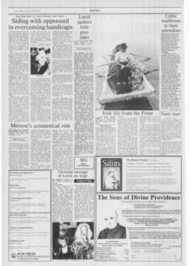Page 8, 15th December 1989
Page 8

Report an error
Noticed an error on this page?If you've noticed an error in this article please click here to report it.
Tags
Share
Related articles
Trivia To Clutter A Young Man's Brain
The Comic Pull Of Catholicism
Martyrs' Mission A La Loyola
A Walk Through Heaven's Gate
Romancing The Gamekeeper An English Obsession
Irish institution takes to Scottish fishing town
Cinema
by, Clive Fisher
RAY McAnally was a wonderful actor. Since I have been writing this column, I have been repeatedly moved and excited by him. In the superb, but largely unsung, No Surrender of 1986 his acting was conspicuously fine, even amongst highly accomplished ensemble playing. Along with Morricone's exultant music, McAnally's Cardinal Altamirano transformed the distended and profligate The Mission into a baroque pearl of a film, imperfect but prized.
More recently, in My Left Foot, playing the father of cerebral palsy victim, Christy Brown, he indicated a dumbness which, while only spiritual, was as acute as his son's, and which could only be overthrown by an equally heroic repudiation of traditional attitudes.
In his native Ireland, he was and remains an institution. English reviewers, beginning to suspect that McAnally touched nothing that he did not also adorn, learnt to expect from him acting which was restrained, dignified, plausible and unpatronising. Were he indolent enough to succumb to typecasting, he could specialise in cases of coarseness concealing gentlenesS. He had the crude and heavy features of a mason, but masons sometimes sculpt and sculptors, as Michelangelo knew, are sometimes peots.
Now he appears,
posthumously, with another Irish performer,, Sinead Cusack, under the aegis of the young and audacious producer Christopher Young, in a Scottish film, Venus Peter (Chelsea, "15").
This idiosyncratic tale, set iii a tiny Scottish fishing town just after the war, was filmed in the Orkneys. Venus Peter is actually the name of the small boy (Gordon Strachan) through whose eyes we witness the quiet stagnation of this now vanished way of life. He in turn was named after his grandfather's (McAnally) fishing boat.
This film is scrupulous in its establishment of time and place. A community is evoked which is as inextricably connected to the sea as Melville's in Mohy Dick, a community which loves and fears the waters which surround it and the depths of which it fishes. The stuff of daily existence is the mending of nets, the telling of fishing tales and the wail for the boat to come in. That routine is broken only once, with the beaching of an injured whale.
But Venus was baptised in the brine and his maritime obsessions are coloured by the suspiciousness and romanticism common to all solitary children. Through him, we witness postwar austerity meticulously recreated with books torn for wrapping groceries but we see also an incestuous people riven with superstition, dominated by the stern promulgations of the minister (David Hayman, excellent) and unaware of the encroachments of an outer reality as exemplified by Venus's father, who leaves to make good and returns in a Jaguar which is soon to dictate the demise of their ancient community.
Venus Peter may be overlong, and some of its eccentrics may trespass into improbability, but by its refusal to flinch from the sinister interpretation imposed on relatively innocent adult behaviour by uncomprehending but imaginative children, it transcends the familiar nostalgia of British cinema to embrace poignant fantasy and unsentimental valediction.
When Harry Met Sally (Odeon, Haymarket, "15") begins and ends with a long kiss. It is the story of how Harry (Billy Crystal) and Sally (Meg Ryan) meet and how through chance encounters and a growing friendship they progress, through 1I years, from mutual antagonism to love.
This is, in other words, in the tradition of self-deceiving lovers who bicker their way into tolerance and maturity. The tradition, as instigated by Hepburn and Tracy, and continued by Rock Hudson and Doris Day, was always popular with Americans. But as analysis has now become America's national occupation, the dialogue has become less sharp and ironic, and increasingly earnest and self-important.
There are several amusing scenes here, but little exploration beneath the surface of slick cinematic manners. Harry, the eternal pessimist, believes it impossible for a man to remain friendly with a girl he finds attractive. Sally is obsessively cautious and meticulous.
The director, Rob Reiner, who made Stand By Me, shows no interest in challenging their extreme positions, or in suggesting that he may really be a desperate romantic and she may want to live a little. There may be some comic situations, but how can people talk about themselves (not each other) for so long? How can they take themselves so seriously?
That said, 14,yan is clearly a rising star. After Inner Space, D.O.A. (both with Dennis Quaid) and Promised Land, she is establishing a screen persona of comic charm tinged with a vulnerability in the face of life's complexity and its refusal to adhere to the schemes of the disorganised and wellintentioned.
blog comments powered by Disqus











